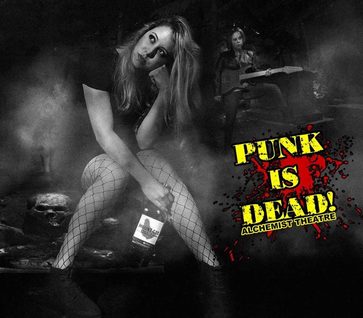|
Playwright/Director Aaron Kopec fuses a couple of different genres together with the latest in his long-running October "Halloween show" tradition. Punk is Dead is a largely two-person drama that grafts horror and drama together in a story of punk metropolitan madness late in the 20th century. The set is a tiny, little apartment in Manhattan crammed with well-worn artifacts. Various bits and pieces previously seen in the Alchemist bar have been collided together into a space that feels very lived-in. Scenic Designer Evan Crain covers the walls in scrawls in and around the edges of the clutter. Liz Mistele plays Don— a fading punk rocker who is struggling to find meaning at the end of an era. She plays at a dive bar somewhere on the edge of obscurity. She is an addict who can’t find what she’s looking for on a bleary stage and she can’t find what she’s looking in chemical insight either. So she's lost. Natasha Mortazavi is dizzyingly sensual as Don’s lover Stoli— A striking nocturnal figure who is suffering from anterograde amnesia. Unable to form any new memories, she is a phantom locked in a past which is becoming more and more dreamlike as the present bleeds into the future. The interaction between Dona and Stoli is very dark. It’s a very mutually abusive relationship but one that is still somehow mutually beneficial for the both of them. There is the weight of a tremendous amount of negativity weighing over both of them. They’re both battling demons that are much bigger than anything that could possibly fit on stage. Mistele and Mortazavi do a good job of keeping the dynamic between the two characters interesting without letting up on the restless darkness that they are both totally immersed in. Relax: there ARE moments of levity. Michael Christopher plays an acquaintance who accidentally stumbles into the lives of the two women. Christopher reacts with comically wide-eyed bewilderment to everything going on between the two women. He really just wants to get to work, but he has fallen into a particularly bad moment for the two lovers. Michael Christopher also plays into one of the more casually innovative moments in the production. Live theatre can appeal to the senses in a way nothing else can. It can be really difficult to embrace the full potential of theatre beyond the confines of most scripts. It’s difficult to engage in the full sensuality of a show without making it feel weird and gimmicky. Occasionally it works. Occasionally you’ll get a live production that appeals to the senses in a way that no other form of drama could. There might be a scent of perfume or cigarettes. Maybe actors are eating actual food in character. Or maybe Randall T. Anderson is relating to an audience the story behind a drink they’re about to have. (I still love his Bartender show.) In this case Kopec has managed to find a rather clever way to deliver part of a story sound alone. With all the lights briefly out, all that’s going on in the play is manifest directly through sound. The lights come up moments later. It’s not exactly clear what happened on the dark, but we have some idea based on the way Christopher is reacting to Mortazavi. It’s a really clever bit of storytelling that amplifies the mystery of what’s going on. Kopec’s put together a really interesting story that hits countless themes that he had explored in the past: the nature of art and reality, dominance and submission, death and rebellion and so on. Real accomplishment here seems to be how seamlessly the supernatural is fused with an earthbound, street-level reality. There is substantial amount of ambiguity as to the true nature of Stoli. She might be afflicted with something very mundane. It could be simple madness. It might be a madness that’s shared by Don or something altogether more sinister. It doesn’t really seem to matter. This is a story primarily about two people and their story is more important than the particulars of what they have been before in the past and what they are now as individuals. It’s a character-driven story, so the specifics of the supernatural are irrelevant. Mistele plays a compelling kind of self-destruction. She plays a character who has been over the edge so many times that it’s difficult to tell where solid ground is for her. She is contrasted against the earthbound ghost Stoli who is very passive-aggressively dominant and sometimes speaks in some of the more compelling poetry in the script. She’s a very simple mystery who commands forcefully with a calm and confident voice. There’s a lot going on in the scene between her and Christopher that rests somewhere way below the surface. As seen in the scene, Mortazavi plays something very sinister and disturbing the feels casually sweet on the surface. As a whole, the script feels lost somewhere between Bram Stoker and William S. Burroughs, which is exactly where it needs to be in order to do what is so good at doing. It’s that interpersonal kind of high-gravity psychological/existential horror. There's a gritty everyday horror about it all. Maybe the worst thing that might happen for everyone is...nothing: an endless repetition of the horror of being trapped in an infinite cycle with no way out. And maybe there’s a way out if Stoli and Don can open-up to it in the right way. It’s a worthy addition to everything else that Kopek has stayed at the Alchemist. Strip back all the labels and reach right into the horror of everyday life as seen in an appealingly punk rearview. It might be his most accomplished yet. Alchemist Theatre’s Punk is Dead runs through Oct. 27 on 2569 S. Kinnickinnic Ave. For ticket reservations and more, visit The Alchemist Theatre online.
0 Comments
Leave a Reply. |
Russ BickerstaffArchives
July 2024
Categories |

 RSS Feed
RSS Feed
